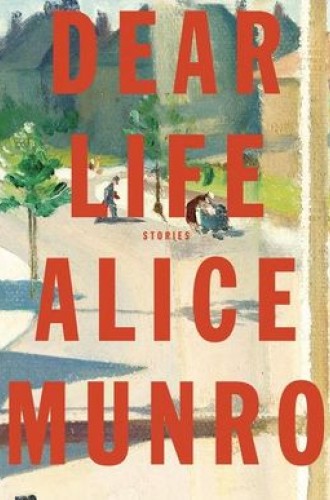Dear Life: Stories, by Alice Munro
The women in many of Alice Munro’s stories are fleeing, in quiet and not-so-quiet ways. A woman has an affair while on a train on her way to Toronto. A young girl in a controlling family runs away with a saxophone player. A repressed woman throws a party without telling her husband. In “Gravel,” the mother of the narrator walks out on a traditional marriage into an arrangement with an actor.
She’d walked out on her silver and her china and her decorating scheme and her flower garden and even on the books in her bookcase. She would live now, not read. She’d left her clothes hanging in the closet and her high-heeled shoes in their shoe trees. Her diamond ring and her wedding ring on the dresser. Her silk nightdresses in their drawer. She meant to go around naked at least some of the time in the country, as long as the weather stayed warm.
Read our latest issue or browse back issues.
Munro’s women flee bad marriages and unfortunate circumstances, but more than anything they seem to be fleeing an interior sense of limitation and self-chosen boundaries. The men they leave behind are rarely bad or evil, and Munro treats her fleeing women with a lightness and a sense of humor that is different from the work of her feminist predecessors, like Kate Chopin. As the narrator of “Gravel” contemplates her mother’s desire to go naked, she says, “That didn’t work out, because when she tried it Caro went and hid in her cot and even Neal said he wasn’t crazy about the idea.”
The way that Munro’s characters conceive of freedom from their limited places in the world do not often match up well with freedom itself. The woman who runs away with the saxophone player has an affair with her minister and loses her children. The woman who has an affair on the train panics when her young child goes missing during her indiscretion. Often the quest for freedom ends up harming others, or a bid for freedom gets tangled in the nets of daily life. Munro’s characters wash up on shore—changed, but not finally released from the difficult work of being human amidst other humans.
Munro respects the pursuit of freedom, however, even as she questions it. Her language is restrained; she never overreaches. If anything, she is too careful, as if reluctant to impinge on her characters’ choices or make judgments about them. When she refuses judgment, she invites a kind of compassion that is spare and even stern, but ultimately loving.
The language she uses to tell these stories is likewise spare, but also beautiful. Occasionally, it is even luminous. In “Amundsen,” a young woman has taken a teaching position at a sanatorium in northern Canada. She steps off the train into this new land.
Then there was silence, the air like ice. Brittle-looking birch trees with black marks on their white bark, and some kind of small untidy evergreens rolled up like sleepy bears. The frozen lake not level but mounded along the shore, as if the waves had turned to ice in the act of falling. And the building beyond with its deliberate rows of windows, and its glassed in porches at either end. Everything austere and northerly, black-and-white under the high dome of clouds. But the birch bark not white after all as you got closer. Grayish yellow, grayish blue, gray.
At first, the language is as sharp and divided as the landscape. You can feel the icy air and the bareness of the terrain. But a subtle shift in perception emerges as the woman gazes on this new horizon. This shift prefigures her own movement in the story, as she learns to see and respond to her new environment. At first she sees only black and white, but she will also need to see various shades of gray.
At the end of this collection, Munro includes four autobiographical sketches that she says are “not quite stories.” “I believe they are the first and last—and the closest—things I have to say about my own life,” she writes. Each one is a meditation on how she learned the art of storytelling and how she learned to discern reality in the midst of things grown-ups told her. Munro depicts herself as a child and as a young woman trying to make sense of the stories other people offered her as true.
At the beginning of the first of these sketches, Munro acknowledges the difficulty she has had in untangling her own reality from her mother’s. Consequently, the narrator of these sketches is deeply suspicious of all received reality—suspicious of herself as a narrator and of others. “Why do I say ominous?” she questions herself. “I didn’t feel frightened.” This tension between the story as it is received and the story as it perhaps is haunts her at every turn.
Questions about the distinction between fiction and reality seem to grow rather than diminish as Munro ages (she is now in her eighties). The final stories before the not quite stories are about older women who cannot quite discern what is fictional and what is real about their own circumstances. As in the autobiographical sketches, the author is haunted by the inescapable truth that creating a story about reality is in a sense creating reality itself. Munro’s first and last subject is the possibility and responsibility that come with that pursuit.







